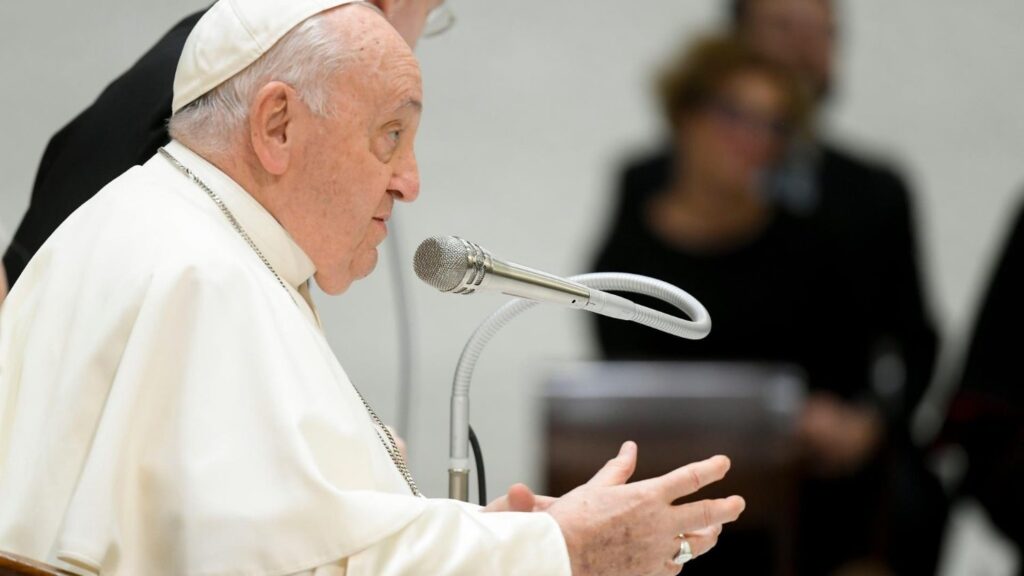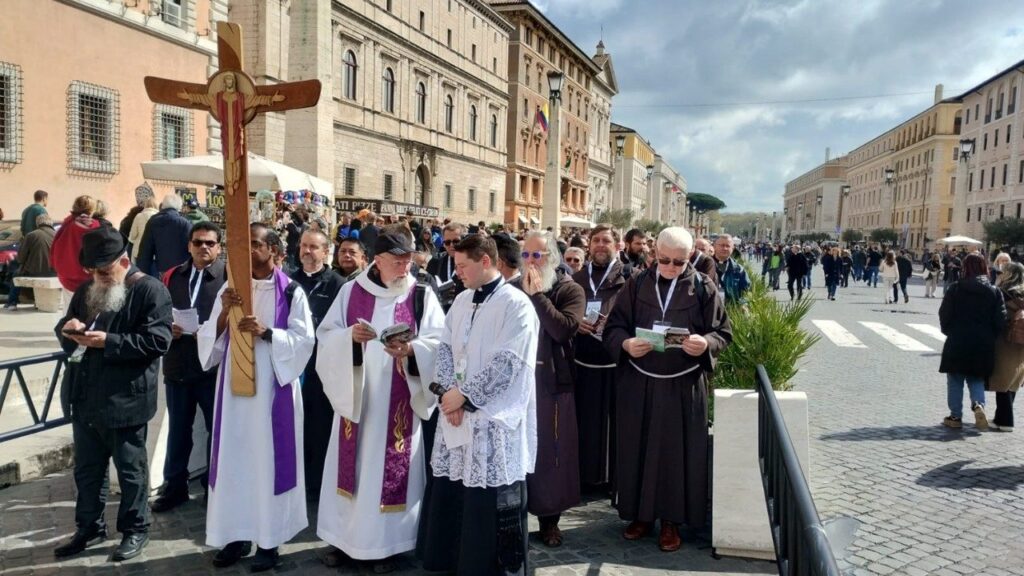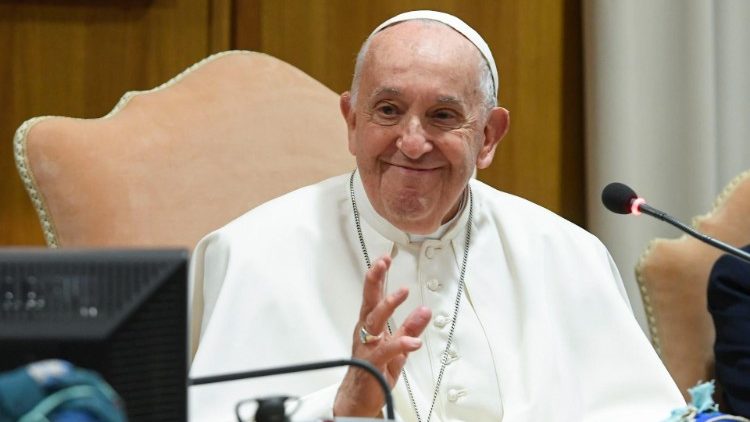Confirmation as the beginning of an Active Life in the Church, not as “Extreme Unction”
General Audience

During the general audience on October 30, Pope Francis dedicated his catechesis to the sacrament of confirmation, inviting the faithful to rediscover the richness of the “first fruits of the Holy Spirit.” In the context of the Jubilee, the Holy Father urged everyone to “shed the ashes of disinterest” and become bearers of the flame of the Spirit.
In his speech in Italian, the Pope, taking up the cycle of catechesis, “The Spirit and the Bride. The Holy Spirit guides the people of God to Jesus, our hope. He focused his meditation on the theme: “He has anointed us and placed his seal on us.” Confirmation, sacrament of the Holy Spirit (Reading: Acts 8:14-17).
After summarizing his catechesis in the various languages, the Holy Father addressed special greetings to the faithful present.
The General Audience concluded with the recitation of the Pater Noster and the Apostolic Blessing.
***
The following text includes parts that were not read out loud, but should be considered as such.
Cycle of Catechesis. The Spirit and the Bride. The Holy Spirit guides the people of God towards Jesus our hope. 11. “He has anointed us and put His seal upon us”. Confirmation, Sacrament of the Holy Spirit
Dear brothers and sisters, good morning!
Today we will continue our reflection on the presence and action of the Holy Spirit in the life of the Church through the Sacraments.
The sanctifying action of the Holy Spirit reaches us primarily through two channels: the Word of God and the Sacraments. And among all the Sacraments, there is one that is quintessentially the Sacrament of the Holy Spirit, and it is on this that I would like to focus today. It is the Sacrament of Confirmation.
In the New Testament, beyond baptism with water, another rite is mentioned, that of the imposition of hands, which has the purpose of communicating the Holy Spirit visibly and in a charismatic way, with effects analogous to those produced by the Apostles at Pentecost. The Acts of the Apostles refer to a significant episode in this regard. Having heard that some in Samaria had received the word of God, they sent Peter and John there from Jerusalem. They “went down and prayed for them, that they might receive the Holy Spirit, for it had not yet fallen upon any of them; they had only been baptized in the name of the Lord Jesus. Then they laid hands on them and they received the Holy Spirit” (8:14-17).
Added to this is what Saint Paul writes in the Second Letter to the Corinthians: “The one who gives us security with you in Christ and who anointed us is God; He has also put His seal upon us and given the Spirit in our hearts as a first instalment” (1:21-22). The guarantee of the Spirit. The theme of the Holy Spirit as a “royal seal” with which Christ marks his sheep is at the basis of the doctrine of the “indelible character” conferred by this rite.
With the passing of time, the rite of anointing took shape as a Sacrament in itself, assuming diverse forms and content in the various ages and different rites of the Church. This is not the place to retrace this very complex history. What the Sacrament of Confirmation is in the understanding of the Church seems to me to be described in a very simple and clear way by the Catechism of adults of the Italian Episcopal Conference. It says: “Confirmation is for all the faithful what Pentecost was for the entire Church. … It reinforces the baptismal incorporation into Christ and the Church and the consecration to the prophetic, royal and priestly mission. It communicates the abundance of the gifts of the Spirit. … If, therefore, Baptism is the Sacrament of birth, Confirmation is the Sacrament of growth. For this very reason it is also the Sacrament of witness, because this is closely linked to the maturity of Christian existence”. [1] The Catechism up to this point.
The problem is how to ensure that the Sacrament of Confirmation is not reduced, in practice, to “last rites”, that is the Sacrament of “departure” from the Church. It is said that it is the farewell Sacrament, because once young people do it they go away and then return for marriage. This is what people say… but we must ensure that it is rather the Sacrament of participation, of active participation in the life of the Church. It is a milestone that can seem impossible, given the current situation throughout the Church, but this does not mean that we should stop pursuing it. It will not be so for all Confirmands, children or adults, but it is important that it is at least for some who will then go on to be the animators of the community.
It can be useful, for this purpose, to be helped in preparing for the Sacrament by lay faithful who have had a personal encounter with Christ and have had a true experience of the Spirit. Some people say that they have experienced it as a blossoming of the Sacrament of Confirmation, received as children.
But this does not relate only to future Confirmands; it relates to all of us and at any time. Together with Confirmation and anointing, we have received, the Apostle assures us, also the bond of the Spirit, which elsewhere he calls “the first fruits of the Spirit” (Rm 8:23). We must “spend” this bond, savour these first fruits, not bury underground the charisms and talents received.
Saint Paul exhorted the disciple Timothy to “stir into flame the gift of God* that you have through the imposition of my hands” (2 Tim 1:6), and the verb used suggests the image of one who breathes on the fire to revive the flame. Here is a good goal for the Jubilee year! To remove the ashes of habit and disengagement, to become, like the torchbearers at the Olympics, bearers of the flame of the Spirit. May the Spirit help us to take a few steps in this direction!
_____________________________
Special greetings:
I greet all the English-speaking pilgrims and visitors taking part in today’s Audience, particulary the groups from England, Australia, South Korea, Sri Lanka, the United States, Canada. Upon all of you, and upon your families, I invoke the joy and peace of our Lord Jesus Christ. God bless you!Summery of the Holy Father’s words:
_____________________________
Summary of the Holy Father’s words:
Dear Brothers and Sisters:
In our continuing catechesis on the Holy Spirit in the life of the Church, we now consider the gift of the Spirit received in the sacrament of Confirmation. In this sacrament, through the laying on of hands we receive the indelible seal of the Holy Spirit, emboldening us to spread and defend the faith as Christ’s true witnesses in the world. Confirmation increases and deepens the life of the Spirit poured out upon us at Baptism and encourages us to actively engage in the life and mission of the Church. Let us pray that the Holy Spirit will guide the young people who receive this sacrament towards a deeper personal encounter with the Lord and a more generous commitment to the spread of the Gospel in years to come.
Related

Technology with a Human Face: Pope Francis’ Call for Ethical and Caring Use
Exaudi Staff
01 April, 2025
1 min

Pope Francis Continues Optimistic Recovery and Maintains Work Pace
Exaudi Staff
01 April, 2025
2 min

The Pope to the Missionaries of Mercy: God became man to reveal to the world that he never abandons us!
Exaudi Staff
30 March, 2025
2 min

God’s Mercy and the Call to Peace in Pope Francis’ Angelus
Exaudi Staff
30 March, 2025
3 min
 (EN)
(EN)
 (ES)
(ES)
 (IT)
(IT)

